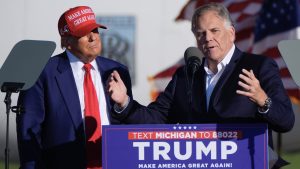Michael Steele criticized the idea that President Donald Trump cannot be racist because he has Black friends, stating that racists can indeed have Black friends. Steele pointed out that Trump has a long track record of racism, such as his support for the execution of five innocent young Black men in the Central Park Five case. In 1989, Trump took out full-page ads calling for the death penalty to be brought back when the Black men were arrested for raping and beating a jogger in Central Park. Steele also mentioned Trump’s reported derogatory comments about nations with large Black populations, as well as his remarks about there being “very fine people on both sides” of a white nationalist rally in Charlottesville, Virginia.
Steele’s comments were made on MSNBC, where he expressed frustration with the notion that having Black friends means someone cannot be racist. He criticized Trump’s actions and statements that have been widely viewed as racist, such as his support for the execution of innocent Black men and his comments about nations with large Black populations. Steele also brought up Trump’s remarks about the white nationalist rally in Charlottesville, where he stated that there were “very fine people on both sides” despite the deadly violence that occurred. Overall, Steele argued that Trump’s actions speak louder than his supposed friendships with Black individuals.
Steele’s reference to Trump’s support for the execution of the Central Park Five highlights a particularly troubling aspect of Trump’s history with race relations. Despite the fact that DNA evidence later exonerated the five Black men, Trump continued to maintain their guilt and call for their execution. This case serves as a stark example of the racism that Steele believes is evident in Trump’s actions and statements, regardless of any friendships he may claim to have with Black individuals. By highlighting this history, Steele challenges the idea that Trump’s relationships with Black people disprove allegations of racism.
In addition to the Central Park Five case, Steele also pointed to Trump’s reported comments about nations with large Black populations as evidence of his racist attitudes. By referring to these countries as “shithole countries,” Trump demonstrated a lack of respect and disdain for Black people and their cultures. Steele also mentioned Trump’s controversial remarks about the white nationalist rally in Charlottesville, where he suggested that there were “very fine people on both sides.” These comments were widely condemned as being supportive of white supremacists and downplaying the violence that occurred.
Overall, Steele’s comments on MSNBC reflect a broader conversation about racism in America and the ways in which it manifests in society and politics. By challenging the notion that having Black friends precludes someone from being racist, Steele highlights the importance of looking at a person’s actions and statements to determine their beliefs. In the case of Trump, Steele argues that his history of racist actions and comments outweigh any claims of friendship with Black individuals. This discussion sheds light on the complexities of race relations in America and the need for deeper conversations about systemic racism and its impact on society.















